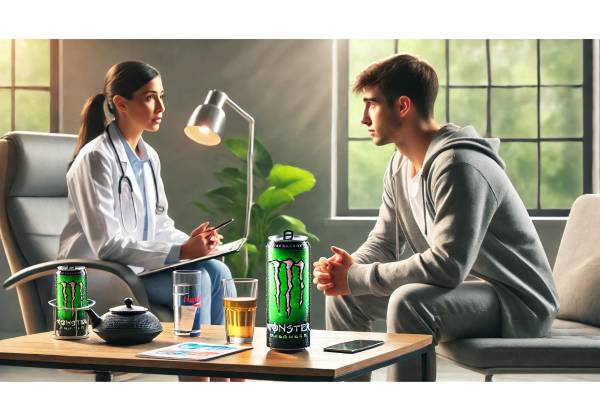
Cracking open an energy drink can feel like an instant power-up—eyes widen, focus sharpens, and fatigue seems to melt away. Yet for some people, those neon cans become an all-day crutch, morphing from a quick pick-me-up into a body-rattling habit that’s hard to shake. Energy drink addiction creeps in quietly through caffeine dependence, sugar spikes, and marketing that promises “limitless” performance. This in-depth guide unpacks how casual sipping can escalate into reliance, how to spot trouble early, and—most importantly—the practical, science-backed steps that help you reclaim steady energy without the crash.
Table of Contents
- Scope of the Problem and Who’s Affected
- Underlying Drivers and Vulnerability Factors
- Warning Signs, Typical Symptoms, and How It’s Diagnosed
- Physical Fallout, Mental Strain, and Social Repercussions
- Evidence-Based Solutions, Self-Help Steps, and Sustainable Recovery
- Frequently Asked Questions
Scope of the Problem and Who’s Affected
A skyrocketing market
Energy drinks have exploded over the past two decades, outpacing soda sales in many regions. Global revenue now tops USD 60 billion annually, with double-digit growth projected as new “clean energy” and “gaming fuel” lines hit shelves. Marketing targets everyone from exhausted parents to late-night coders, promising focus, stamina, and a social identity built around “hustle culture.”
Who’s most at risk
- Teens and college students: Nearly 40 % report weekly use; exam seasons push numbers higher.
- Shift workers: Nurses, drivers, and factory staff lean on cans to fight circadian misalignment.
- Athletes and gamers: Stimulant drinks are woven into sponsorships, streaming culture, and locker rooms.
- High-stress professionals: Lawyers, traders, and developers sip to stay “on” while juggling deadlines.
Prevalence of heavy consumption
Surveys define heavy use as ≥ 300 mg caffeine from energy drinks per day—roughly two large cans. Estimates range from 8 % of adults to over 20 % of university populations. Because labels can under-report caffeine or hide additional stimulants (guarana, yerba maté, yohimbine), true intake is often higher than users realize.
From habit to dependence
Energy drink addiction doesn’t look like illicit drug abuse, but the cycle is similar: tolerant brains demand larger doses; withdrawal brings headaches, irritability, and fog; life without a can feels unthinkable. Recognizing that progression early is key to preventing deeper health consequences.
Underlying Drivers and Vulnerability Factors
Energy drink addiction emerges from an intricate weave of biology, psychology, and environment. Understanding these threads helps you build a targeted game plan rather than relying on raw willpower.
Biological hooks
- High-dose caffeine—up to 300 mg in a single tall can—blocks adenosine, the brain’s sleepiness messenger. Over time, adenosine receptors multiply, creating tolerance and setting the stage for withdrawal.
- Sugar and sweeteners deliver rapid glucose spikes. Pairing caffeine’s dopamine kick with sugar’s reward surge strengthens the habit loop.
- Add-on stimulants (taurine, ginseng, B-vitamin megadoses) may synergize with caffeine, increasing heart-rate impact and reinforcing the “buzz.”
- Sleep debt compensation: Chronic sleep restriction raises cortisol and intensifies caffeine’s perceived benefits, pushing users to dose higher the next day.
Psychological magnets
| Driver | Why it reinforces use | Mini counter-move |
|---|---|---|
| Performance anxiety | Fear of under-delivering fuels “just one more can.” | Plan caffeine-free confidence rituals: breathing, power poses, positive self-talk. |
| Reward ritual | Cracking a can marks study sessions, workouts, or gaming wins. | Swap with non-caffeinated cues (sparkling water, stretch break). |
| Identity signaling | “Monster, Red Bull, or Prime” culture forms social bonds. | Join communities centered on hobbies, not beverages—e.g., book clubs, climbing gyms. |
| Instant mood lift | Dopamine spikes ease low mood or boredom. | Schedule micro-joys: sunlight walks, favorite songs, gratitude notes. |
Social and environmental accelerants
- Campus convenience: Energy drinks outnumber water fountains in many vending machines.
- Gamified marketing: Limited-edition cans, streak challenges, and influencer codes encourage stockpiling.
- Workplace norms: All-hands meetings often feature free cases as a “perk,” normalizing heavy use.
- Sleep-unfriendly culture: All-night study marathons, double shifts, and “rise and grind” memes celebrate short rest and high stimulant intake.
Genetic considerations
Polymorphisms in the CYP1A2 gene affect caffeine metabolism speed—slow metabolizers feel jittery faster, while fast metabolizers may chase higher doses to achieve the same kick, raising addiction risk.
Warning Signs, Typical Symptoms, and How It’s Diagnosed
Energy drink addiction often hides behind everyday busy-ness. The cues below help differentiate harmless sips from dependency.
Early behavioral red flags
- Reaching for the first can within 30 minutes of waking.
- Planning daily tasks around purchase points (“Need to stop at the gas station for a 2-for-\$5 deal”).
- Feeling uneasy at social events without an energy drink in hand.
- Replacing meals with cans to “save time” or “cut calories.”
Physical and mental symptoms
| Symptom | What it feels like | Why it happens |
|---|---|---|
| Palpitations | Rapid, pounding heartbeat, especially at rest | Excess caffeine stimulates beta-adrenergic receptors |
| Anxiety spikes | Restlessness, racing thoughts, tremors | Elevated adrenaline and cortisol |
| Rebound fatigue | Crash two to six hours after a can | Blood sugar drop + adenosine buildup |
| Digestive upset | Acid reflux, diarrhea | Caffeine and carbonation irritate GI lining |
| Insomnia | Trouble falling or staying asleep | Caffeine’s half-life averages 5–6 hours |
Withdrawal checklist
If you skip your usual dose for 12–24 hours and develop throbbing headaches, irritability, depressed mood, or foggy concentration, your body is signaling dependence.
Diagnostic approach
- Caffeine Use Disorder (CUD) criteria: DSM-5 recognizes CUD in the appendix. Clinicians look for tolerance, unsuccessful cutbacks, cravings, and continued use despite harm.
- Intake diary: Record brand, size, and time for one week. Include other caffeine sources—coffee, pre-workout powder, soda, chocolates. Numbers often surprise users.
- Vitals and labs: Blood pressure, heart rate, fasting glucose, and, when indicated, ECG if palpitations or chest pain occur.
- Screening for co-occurring issues: Anxiety disorders, ADHD, or sleep apnea can drive self-medication with caffeine.
Early clarity turns vague concern into actionable steps—no guilt trips, just data guiding change.
Physical Fallout, Mental Strain, and Social Repercussions
Energy drink addiction can quietly erode health and happiness long before an emergency-room dash for heart palpitations.
Bodily consequences
- Cardiovascular load: High caffeine coupled with other stimulants spikes blood pressure and may trigger arrhythmias, especially in those with genetic heart conditions.
- Metabolic strain: Sugary varieties raise insulin demand; long-term heavy use links to weight gain, type 2 diabetes risk, and fatty-liver markers.
- Kidney stress: High taurine and vitamin B6 loads, plus frequent dehydration, can tax kidneys and concentrate urine, increasing kidney-stone probability.
- Dental erosion: Acidic pH demineralizes enamel more aggressively than cola.
Cognitive and emotional toll
| Impact | Real-life expression | Reader tip |
|---|---|---|
| Mood lability | Swinging from pumped to irritable after crashes | Eat balanced meals every 4 hours; stabilize blood sugar. |
| Attention zig-zags | Bursts of laser focus followed by “scroll holes” | Apply the Pomodoro technique with caffeine-free herbal tea. |
| Heightened anxiety | Social jitters, panic episodes | Implement slow exhale breathing (4-7-8 pattern) during cravings. |
| Sleep debt snowball | Short nights, unrefreshing mornings | Establish a firm “caffeine curfew”: no stimulants after 2 PM. |
Social and academic/work setbacks
- Missed deadlines from crash naps or jittery procrastination.
- Money drain—\$4 per can × 3 daily = over \$4,000 per year.
- Relationship friction when mood swings and late-night buzzing keep partners awake.
- Sport performance dips—Excess stimulants can dehydrate and impair fine motor control during competitions.
Recognizing these ripple effects motivates change beyond simply “cutting back because it’s healthy.”
Evidence-Based Solutions, Self-Help Steps, and Sustainable Recovery
Breaking free from energy drink addiction is doable with a layered strategy: gradual tapering, habit rewiring, nutrition tweaks, and professional support when needed.
1. Set a clear quit or taper goal
- Cold turkey works for mild users (< 200 mg caffeine/day). Expect withdrawal for 2–7 days.
- Gradual reduction: Decrease daily caffeine intake by 50 mg every three days—swap one can for decaf soda, then sparkling water.
- Scheduled substitution: Replace the “must-have” morning can first, then tackle afternoon, then evening.
2. Replace the ritual, not just the liquid
- Sensory swaps—sparkling water with citrus slices for the fizz; iced unsweetened green tea for mild caffeine; herbal adaptogen tonics (ashwagandha, rhodiola) for stress support.
- Physical cue breakers—Keep hands busy with stress balls, doodling, or mini desk stretches at usual sipping times.
- Environmental tweaks—Move energy drinks out of sight: top pantry shelf, car trunk, or—best—do not keep them at home.
3. Stabilize energy naturally
| Domain | Practical tip |
|---|---|
| Sleep hygiene | Aim for 7–9 hours. Dark, cool room; screens off 60 min before bed. |
| Balanced macros | Pair complex carbs with protein and healthy fat to smooth glucose curves. |
| Hydration | 2–3 liters water daily; add electrolytes if you sweat heavily. |
| Movement | Ten-minute brisk walks or desk push-ups each 90 minutes boost alertness. |
| Stress relief | Five-minute meditation breaks; journal wins and worries. |
4. Cognitive-behavioral strategies
- Trigger mapping—List emotions, times, and places tied to cravings. Color-code high-risk windows.
- Thought reframing—Change “I can’t function without a can” to “I’m teaching my brain to function sustainably.”
- Reward replacement—Treat yourself with a podcast episode, stretch session, or healthy snack after finishing tasks instead of chugging a drink.
5. Professional interventions
- Dietitian consults to build energy-steady meal plans.
- Psychotherapy (CBT, ACT) for deep-seated anxiety or ADHD driving overuse.
- Medical support—Beta-blockers for tachycardia, melatonin for reset sleep cycles, or short-term headache medication during withdrawal (avoid rebound by limiting to three days).
- Support groups—SMART Recovery, Caffeine Anonymous, or wellness forums provide accountability partners.
6. Long-term relapse prevention
- Caffeine journal—Record intake monthly to catch creeping doses.
- Energy audit—Quarterly review of sleep, diet, stress, and movement; adjust lifestyle before a crisis hits.
- Goal stacking—Tie caffeine control to bigger aspirations (marathon training, saving for travel) to keep motivation fresh.
- Social cues—Politely decline free cans; share your journey so friends understand boundaries.
Freedom from energy drink addiction isn’t about bland days—it’s about steady, reliable energy that supports your ambitions without spiking your heart rate or draining your wallet.
Frequently Asked Questions
How much caffeine is safe per day?
Most health guidelines cap total caffeine at 400 mg daily for adults—about two regular energy drinks. Sensitive individuals, teens, and pregnant people should aim for far less.
Can sugar-free energy drinks still cause addiction?
Yes. Caffeine and other stimulants drive dependence, even without sugar. Artificial sweeteners can also reinforce flavor-reward loops.
What’s the fastest way to stop energy drinks without headaches?
Gradual tapering—cut 50–100 mg caffeine every three days while hydrating and using over-the-counter pain relief sparingly—minimizes withdrawal headaches.
Do vitamin-packed energy drinks count as supplements?
Marketing suggests that, but mega-doses of B-vitamins mainly color urine. They don’t negate stimulant risks or replace a balanced diet.
Are natural “clean energy” drinks safer?
Matcha-based or green-tea drinks may offer antioxidants and steadier release, yet their caffeine still contributes to total intake. “Natural” doesn’t always mean low risk.
How long until my sleep normalizes after quitting?
Most people notice better sleep quality within one to two weeks. Deep-sleep cycles continue improving over three months as adenosine receptors recalibrate.
The information provided here is for educational purposes only and is not a substitute for professional medical advice, diagnosis, or treatment. Always consult a qualified healthcare provider with questions about caffeine use or withdrawal.
Was this guide helpful? Share it with a friend on Facebook, repost it on X, or spread the word wherever you hang out online. Your support keeps our team brewing more evidence-based, approachable content—thank you!






